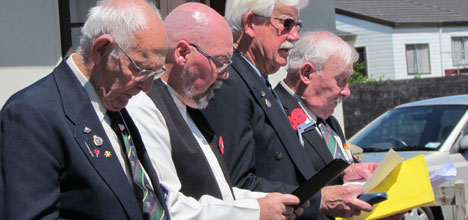The gathering may have been small but the heartfelt importance of remembering those who made sacrifices during World War 1 was anything but at Tauranga RSA today.
At 11am, in a symbolic way, flags of the different countries involved in the world's first war swayed in the breeze as Tauranga residents and returned servicemen honoured those who fought for today's freedom.
Tauranga RSA president Dick Frew, Reverend John Hebenton, Lieutenant Colonel David Ogilvy and Tauranga RSA vice president Fred Milligan.
Lieutenant Colonel David Ogilvy, who addressed about 30 people today, says Armistice Day is significant for many reasons: notably remembering those who sacrificed their lives for future generations and signifying when New Zealand became a patriotic country.
'[It was when] the spirit of nationalism in NZ manifested,” says David, who himself is a member of the original SAS formed in 1955.
'As a result [of Armistice Day and the end of WW1], fellows came back and recognised they were Kiwis and they wanted to have an independent country.”
Armistice Day recognises that on the 11th hour of the 11th day of the 11th month in 1918, the allies officially ended hostilities with Germany, after more than four years of war – marking the end of WW1.
David, a Tauranga resident, says some of the war's statistics 'are hard to comprehend”.
'The total casualties were 37million – 18m deaths and 19m wounded – and of those casualties 10m were military; and of these, six million were allied forces and four million were on the opposition's side – the figures are just mind-boggling.”
David says NZ's contribution saw the country lose 18,000 souls and 50,000 wounded.
'We had 120,000 under arms, of whom 103,000 served overseas – a tenth of our population at that time.
'NZ's military commitment was huge – and it should also be recognised 202,000 Maori soldiers were included in the war effort – and a further 3000 soldiers served with the Australian forces.”
Organiser of the Armistice Day commemoration at Tauranga RSA Bob McClintock says the day is to remember and pay tribute to those that have fallen, from the beginning of the First World War and also the Boer War.
'The 11th of the 11th is so valuable to the First World War – there's remembrance in just about in every country in the world.”
Bob says this particular commemoration is bittersweet because it marks the end of a war – but many people still suffered before it ended.
'It signals that Armistice and most of the people here today are returned servicemen – we're here to remember our comrades.”



 Click the image above to view slideshow
Click the image above to view slideshow
0 comments
Leave a Comment
You must be logged in to make a comment.